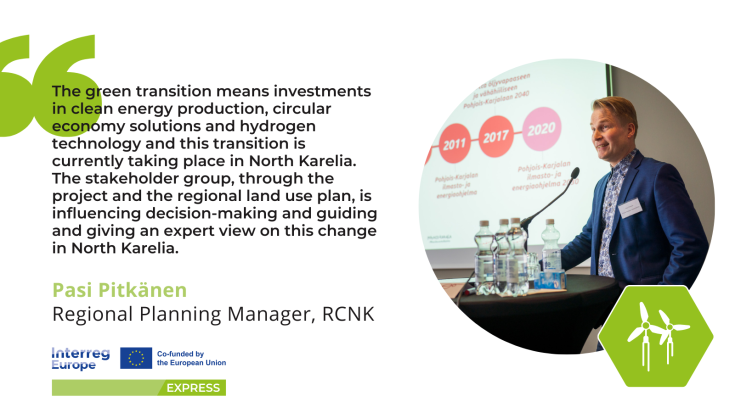Finland | Advancing North Karelia's Green Transition
The stakeholder group of the Regional Council of North Karelia’s Express project gathered to hear the latest news from the energy sector in North Karelia. The energy expert group consists of representatives from 26 different organizations, including research and development organizations, public administration and private sector. The group acts as both a stakeholder group in the Express project and as an expert group for the North Karelia Regional Plan 2040, serving as a significant tool in both the planning process and the advancement of the project.
The green transition means investments in clean energy production, circular economy solutions and hydrogen technology and this transition is currently taking place in North Karelia. The stakeholder group, through the project and the regional land use plan, is influencing decision-making and guiding and giving an expert view on this change in North Karelia, says Regional Planning Manager Pasi Pitkänen from Regional Council of North Karelia.
Strategic studies lay ground for the regional planning process
Regional Council of North Karelia is preparing the Phase 2 plan for the Regional Land Use Plan 2040, which specifically addresses the land-use needs of electricity transmission line routes and renewable energy investments, as well as updates on landscape and groundwater areas. As a part of the planning process, an assessment is being made of how energy production and usage, as well as energy transmission networks in North Karelia, are likely to develop by 2040 and how land use should be prepared for the needs of developing the energy infrastructure in the region during that period. The summary of the study includes, among other things, route options for the required 400 kV power grid connection for energy investments. Studies are also being prepared to identify potential wind and solar energy areas to support the drafting of the regional plan.
Several investment projects for the green transition
Large-scale wind and solar power projects are underway in North Karelia, totaling about 20, and they are linked to opportunities in the hydrogen economy. However, the development of the grid requires that planned energy production and consumption investment projects are visible on investment lists and connection inquiries are made, so that the future electricity transmission needs are foreseeable for the National grid company Fingrid. Therefore, communication and open discussion on critical infrastructure investments is needed.
Energy Statistics of Eastern Finland sheds light on the energy trends in the region
The Energy Statistics of Eastern Finland 2022 has been completed. From the statistics, it can be observed that the share of renewable energy has increased by one percentage point to 72 percent from 2020, and self-sufficiency in energy has reached 69 percent. According to the energy statistics, the share of wood energy continues to grow and accounts for over half (54%) of the entire energy use in the region. The use of heat pumps has significantly increased over the past two years. At the same time, the use of fossil heating oil has decreased by nearly the same amount in terms of energy volume. Challenges mainly lie in reducing emissions from transportation, as the share of transportation in the region's total energy use is significant, accounting for nearly one fifth.
Reaching the goals of the EXPRESS project, aiming for 80% renewable energy and 80% self-sufficiency, is not a given. It requires significant investments in wind and solar power, transitioning from direct biomass-based energy production to utilizing waste heat from various bio-refineries and hydrogen production, as well as further improving energy efficiency and strengthening energy flexibilities.
The SWOT analysis and study visits of the EXPRESS project have aroused interest
As part of the EXPRESS project, a SWOT analysis of the green energy transition is being prepared, which is currently in the draft stage. The draft identifies a wide range of strengths, weaknesses, threats, and opportunities related to the green energy transition in the region. The SWOT analysis will be followed by scenario analysis up to 2035. Various development paths for the green transition are to be anticipated by describing alternative development scenarios, which will be developed in collaboration with stakeholders. Additionally, the aim is to identify various measures to accelerate the green transition in North Karelia.
Highlights and results of study trips to Rzeszow, Poland, and Kilkenny, Ireland, were presented to the energy group. Particularly, the examples of participatory wind power from Ireland sparked interest.
